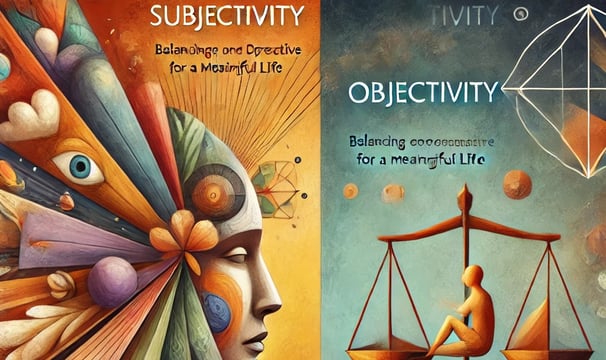

Subjectivity and Objectivity
In colors bright, emotions take flight,
Through logic's lens, truth gleams in light.
Together they weave life’s intricate art,
A balanced mind, a harmonious heart.
Subjectivity and objectivity are two fundamental concepts that shape human understanding, decision-making, and interactions. Both have significant roles in personal and professional spheres, influencing how individuals perceive the world, make choices, and resolve conflicts. Understanding their distinctions and interdependence is crucial to leading a balanced and meaningful life.
Subjectivity: The Personal Lens
Subjectivity refers to personal perspectives, feelings, and biases that influence how individuals interpret experiences and information. It stems from unique backgrounds, emotions, cultural influences, and individual values. While subjectivity allows for creativity, empathy, and individuality, it can also lead to biased judgments and misinterpretations.
For example, consider an art exhibition. One viewer may see a painting as a profound commentary on human suffering, while another may find it uninspiring or confusing. Both interpretations are valid because art is inherently subjective and reflects personal experiences and emotions. Similarly, in relationships, subjective feelings often dictate how people respond to conflicts. A partner may feel unappreciated despite objective evidence of care, highlighting how personal perceptions can shape emotions.
However, subjectivity must be tempered by self-awareness. When unchecked, it can lead to misunderstandings and irrational decisions. For instance, an employee might feel unfairly treated during a performance review without considering the objective metrics behind the evaluation.
Objectivity: The Impartial Truth
Objectivity, in contrast, represents a detached, unbiased perspective that relies on facts and evidence. It is the cornerstone of rational thinking, scientific inquiry, and fair decision-making. Striving for objectivity involves setting aside personal emotions and prejudices to evaluate situations with clarity and impartiality.
In the courtroom, objectivity is essential. A judge must base decisions on evidence, laws, and precedents, rather than personal beliefs or emotions. Similarly, in the workplace, objective performance assessments ensure fairness by focusing on measurable outcomes rather than subjective opinions.
Real-life situations often demand objectivity to resolve conflicts or make ethical decisions. For instance, a manager choosing between two equally deserving employees for a promotion must rely on clear criteria, such as performance metrics and qualifications, rather than personal favoritism.
The Balance: Subjectivity and Objectivity in Harmony
While objectivity provides a foundation for fairness and rationality, subjectivity enriches life with empathy, creativity, and passion. The interplay between the two is vital for personal growth, effective communication, and ethical living.
In parenting, for example, balancing subjectivity and objectivity is crucial. A parent might feel an emotional urge to protect their child from failure (subjectivity), but allowing the child to face challenges and learn from them is often a more objective and beneficial approach.
Similarly, in leadership, effective decision-making requires both perspectives. A CEO planning a company's strategy must analyze market trends and data objectively, but they must also consider the subjective needs of employees and customers to foster a supportive and innovative environment.
Importance in Life
The ability to recognize and balance subjectivity and objectivity is essential for personal and professional success. Subjectivity fosters meaningful relationships, artistic expression, and emotional intelligence, while objectivity ensures fairness, critical thinking, and effective problem-solving.
For instance, during a disagreement, understanding the subjective experiences of others helps build empathy, while employing objective reasoning helps find a solution that benefits everyone. Likewise, in education, combining subjective passion for a subject with an objective understanding of its principles can lead to deeper learning and innovation.
Conclusion
Subjectivity and objectivity are not opposing forces but complementary aspects of human understanding. Recognizing their roles and maintaining a balance enables individuals to navigate life's complexities with wisdom and compassion. Whether resolving conflicts, making decisions, or fostering relationships, the harmony between subjective feelings and objective reasoning is the key to a fulfilling and purposeful life.
